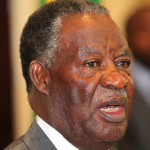
The students from the University of Zambia (UNZA) had been protesting outside President Sata’s office, demanding an audience with him. The president was not in Lusaka that day, but when contacted he ordered police to arrest the protesters and instructed his education minister to have them expelled from the university.
The president said he had information that opposition United Party for National Development (UPND) leader Hakainde Hichilema had sponsored the students to engage in unruly behaviour.
“Today (May 17) some opposition leaders like HH (Hakainde Hichilema) are taking money to buy students from UNZA to cause trouble at Arcades and on the Copperbelt. To this end, I ask you Minister of Education, identify those students, expel them from the university and hand them over to Ms (Joyce) Kasosa (Lusaka province Commissioner of Police) who will arrest them,” he said.
Mr Sata said it would cost the country KR250 million to build five universities and that KR1.1 billion was being spent on subsidies, which was wrong. He said Zambians sacrificed a lot during the privatisation process, when people like Mr Hichilema allegedly enriched themselves at the same time.
“It is immoral for us to subsidise fuel when our children can’t even afford an education. I am appealing to all Zambians to trust me because our priority is to distribute national resources equitably,” he said.
Meanwhile, Minister of Education Dr John Phiri warned students in various public universities not to be used by disgruntled politicians as tools to cause confusion.
“There are disgruntled Zambians out there who want to use students in universities and colleges to cause confusion. As minister in charge, I will not allow this and I want to warn students not to allow themselves to be used as tools of confusion,” Dr Phiri said.
Mr Sata reportedly retracted after concerns were raised by opposition political parties, civil rights organisations and the international community. The students were forced to pay ‘admission of guilt fines’.









